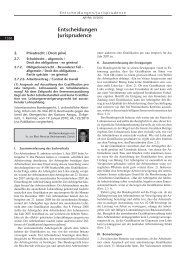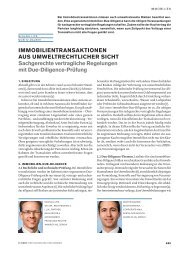ASAB 29-3 Thomas Rohner Michael Lazopoulos - Pestalozzi ...
ASAB 29-3 Thomas Rohner Michael Lazopoulos - Pestalozzi ...
ASAB 29-3 Thomas Rohner Michael Lazopoulos - Pestalozzi ...
You also want an ePaper? Increase the reach of your titles
YUMPU automatically turns print PDFs into web optimized ePapers that Google loves.
T. ROHNER & M. LAZOPOULOS, RESPONDENT’S REFUSAL TO PAY ITS SHARE OF THE<br />
ADVANCE ON COSTS<br />
“[…] Que l’acceptation contractuelle du règlement CCI ne peut<br />
pas donner à la demanderesse un droit (au remboursement de la<br />
moitié de la provision intégralement versée) que le règlement CCI ne<br />
lui donne pas; […]” 78<br />
A similar approach was taken in ICC Case 12895 79 . In this case,<br />
however, the arbitral tribunal dismissed the claimant’s request because the<br />
claimant did not make any substituted payment on behalf of the defaulting<br />
respondents, but rather asked the arbitral tribunal to order the defaulting<br />
respondents to pay their shares of the advance on costs. The arbitral tribunal<br />
left the question unanswered as to whether it would have granted a request<br />
for reimbursement had the claimant substituted the advance on costs of the<br />
defaulting respondents:<br />
“[…] Under the ICC Rules, it is the Court or the Secretary<br />
General, and not the Arbitral Tribunal, who has authority to deal with<br />
circumstances where a party fails to pay its share of the advance on<br />
costs. The underlying rationale for the Court or Secretary General<br />
being the competent authority is that the arbitrators have a personal<br />
interest in being paid their fees. If an arbitral tribunal were to order a<br />
party to pay its share of the advance on costs, its decision might be<br />
viewed as self-serving and lacking in independent and unbiased<br />
judgment. Such is not the case when one party has already paid the<br />
full advance on costs and requests the tribunal to order the nonpaying<br />
party to reimburse it […].”<br />
III. Summary<br />
Arbitration is a consensual mechanism of dispute resolution which<br />
implies the parties’ obligation to pay the advance on costs as requested by the<br />
arbitral tribunal, or – as the case may be – by the arbitral institution. The<br />
respondent who fails to pay its respective share of the advance on costs is in<br />
breach of its contractual obligation towards the claimant under the arbitration<br />
agreement.<br />
Disputes regarding the non-payment of the advance on costs fall within<br />
the scope of the arbitration agreement. Consequently, the arbitral tribunal has<br />
the power, upon request of the claimant, to render a decision on the<br />
78<br />
79<br />
Free translation into English: “The mere contractual acceptance of the ICC Rules does not give the<br />
claimant a right (to the reimbursement of half of the advance paid in total) that the ICC Rules do not<br />
provide for him […].”<br />
Procedural order no. 10 dated 2005 (unreported) in ICC Case 12895, cited in: MICHAEL<br />
BÜHLER/THOMAS WEBSTER, supra note 27, at 437.<br />
<strong>29</strong> ASA BULLETIN 3/2011 (SEPTEMBER) 569




